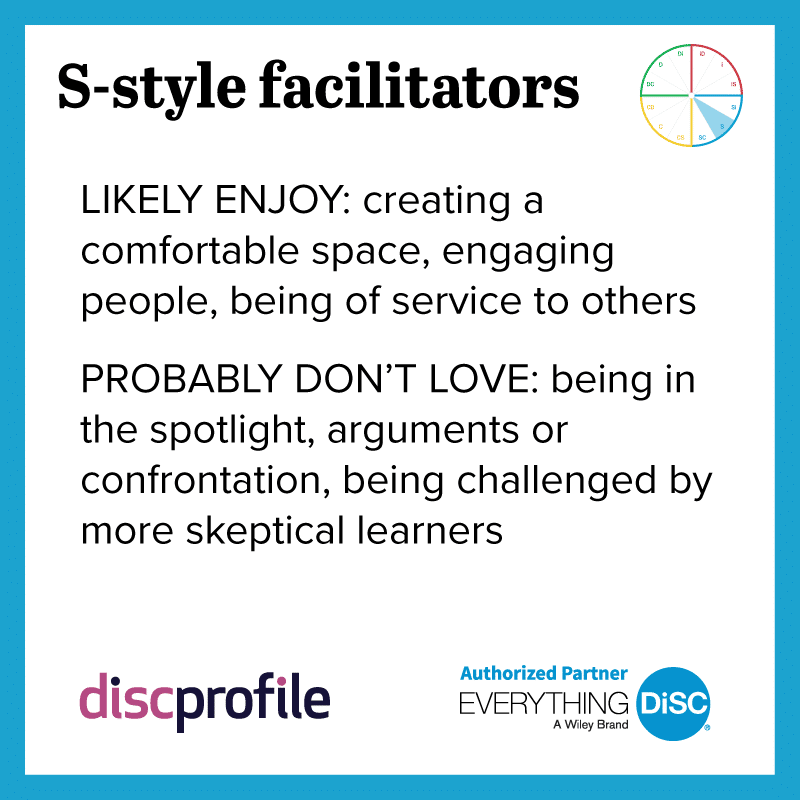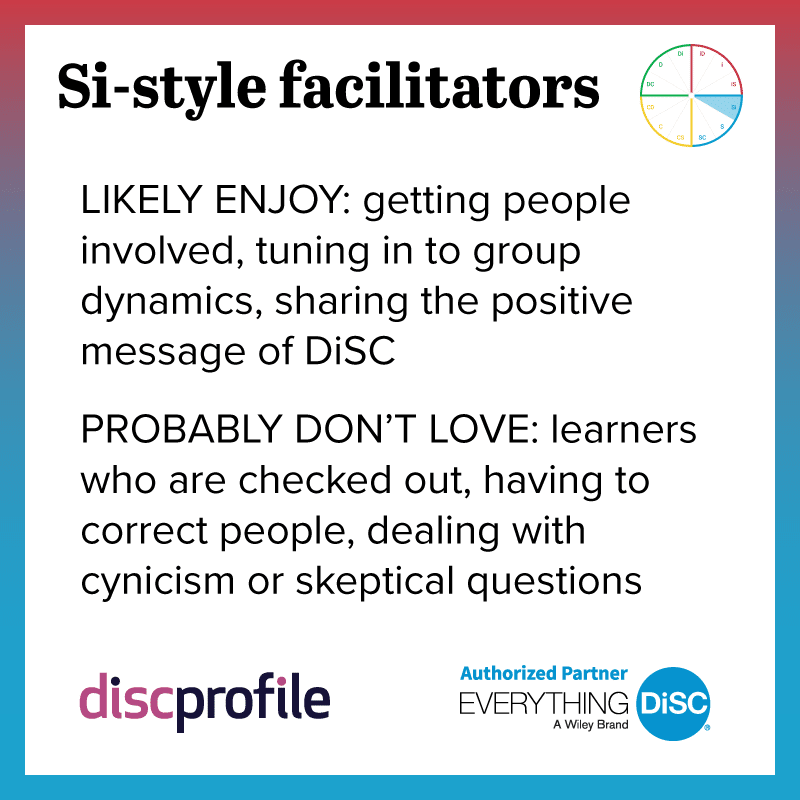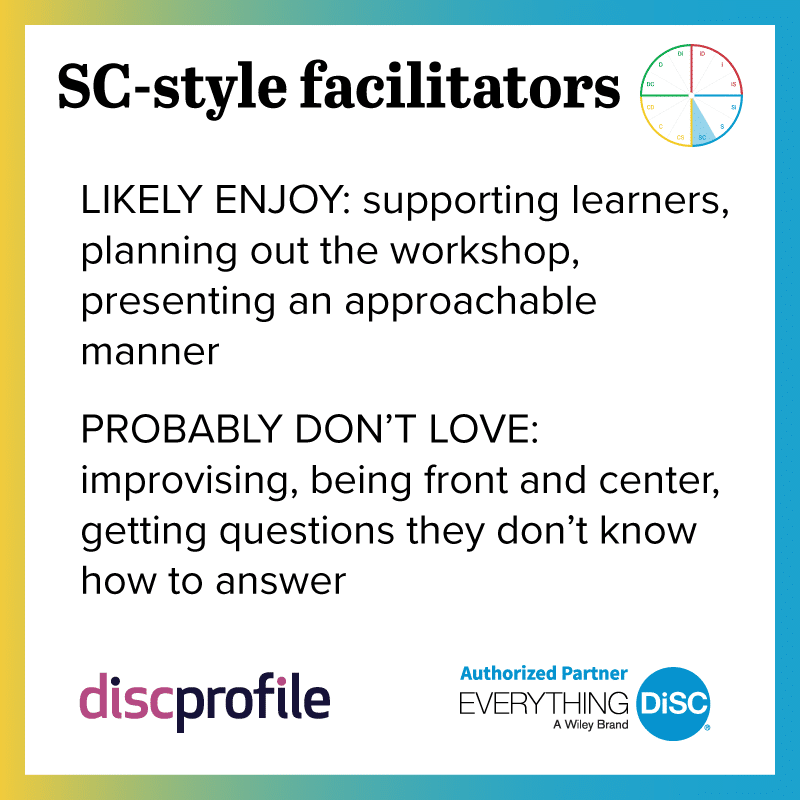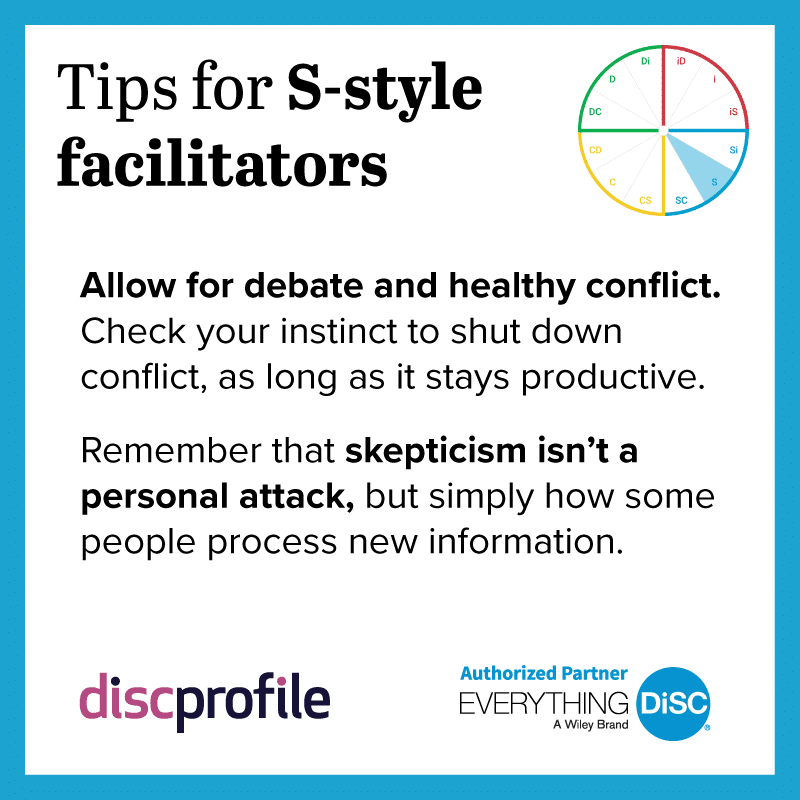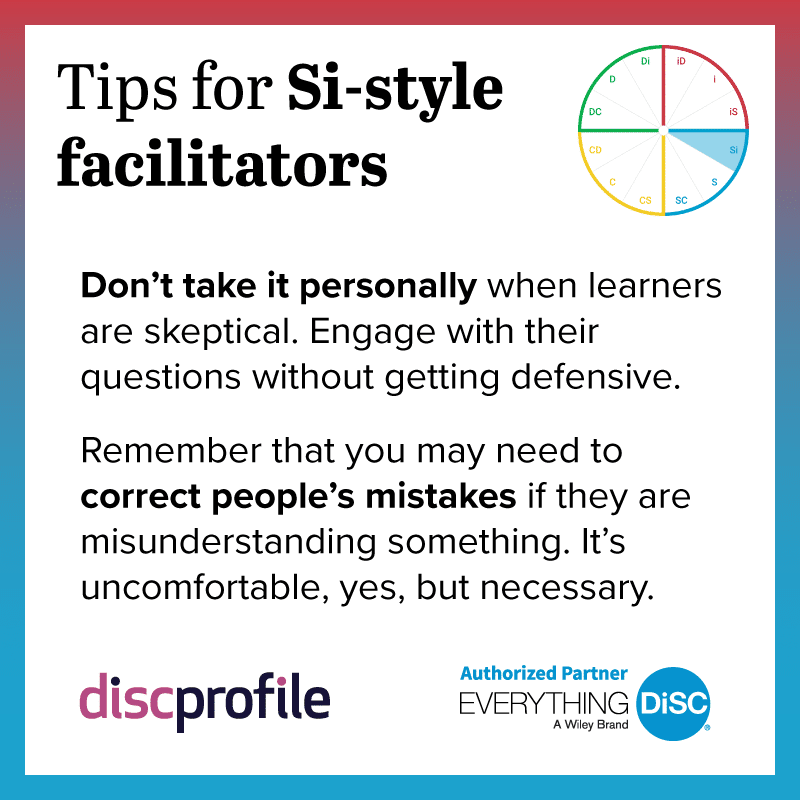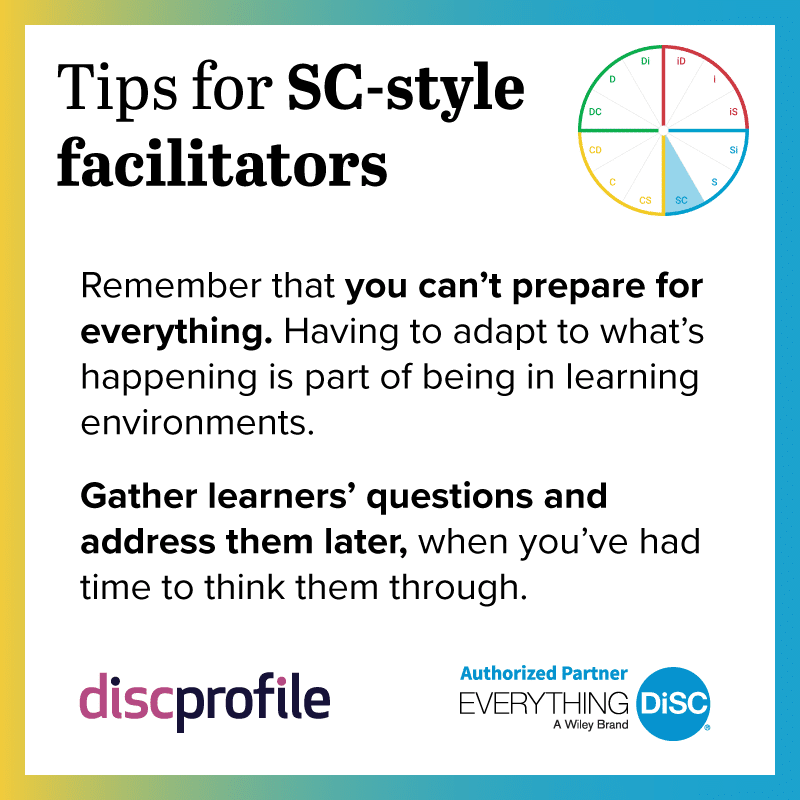How does your DiSC® style show up when you are facilitating workshops? Understanding this helps you develop training sessions that call upon your strengths to create the greatest impact for learners.
When facilitating, you may notice your DiSC style in your pace, how you approach group activities, and the level of detail you go into. If you’re a facilitator with an S-type personality, you likely prefer a steady pace. You might be drawn to facilitation more as a way to help others than as an opportunity to be in the spotlight. You probably want to foster, rather than dominate, conversations.
Getting prepared
One recommendation we give to facilitators of all styles is to review learners’ profiles and group reports ahead of time. As an S-style facilitator, you probably don’t love being put on the spot in front of a group. Each training session will be unique and surprising in its own way, and you can’t prepare for every possibility. But reviewing learners’ styles in advance—as well as the style of the group as a whole—can help you get in the right mindset. You’ll know a bit more about what you’re getting into and can ready a plan for responding to a variety of learning styles.
For example,
- C-style groups could show up with a more skeptical lens than you would; think ahead about how you’ll answer their questions.
- If you have a group heavy on D-type personalities, prepare yourself for more spirited debate by reviewing tips for productive conflict.
- If you’re facilitating for a group with lots of fellow S-style folks, however, you may need to actually encourage debate and challenging questions in order to create a more engaging space.
- If your group has a lot of i-style learners, be ready to redirect discussions that have gotten off-topic, or even gently interrupt when it’s time to move on from a certain conversation.
We offer tips specific to S, SC, and Si styles below. (See also: Tips for C-style facilitators, i-style facilitators, and D-style facilitators.)
Your S style as a facilitator
As an S-style facilitator, you probably enjoy:
- creating a learning space where everyone is comfortable
- noticing when people are withdrawn or checked out and finding ways to engage them
- using facilitation as a way to be of service to others
You may not love:
- being in the spotlight
- dealing with conflict, arguments, or confrontation
- being challenged or questioned by more skeptical learners
Tips for S-style facilitators
- Allow for debate and healthy conflict. Your tendency may be to jump in when you see conflict of any kind, but sometimes these debates lead to the greatest learning. Of course, trust your instincts to intervene when people seem to be getting overwhelmed, but remember that you are likely less comfortable with conflict than many others in the room.
- Remember that skepticism isn’t a personal attack. Some people process new information through a skeptical lens, no matter how you present it to them. This just gives you the opportunity to feed their curiosity. If people are asking questions, that means they’re engaged.
Your SC style as a facilitator
As an SC-style facilitator, you probably enjoy:
- supporting learners and guiding them on their DiSC journey
- planning out your workshop, practicing, researching, and thinking through how you will respond to various scenarios
- presenting an approachable and sincere manner
You may not love:
- being asked questions you don’t know how to answer
- having to improvise when the unexpected happens
- being front and center
Tips for SC-style facilitators
- Remember that you can’t prepare for everything. Sometimes you’ll have to go with the flow and adapt to what’s happening in the room. That’s a natural part of learning environments.
- Say, “Let me get back to you on that” when you don’t know how to answer a question. You can gather learners’ questions and address them later when you’ve had time to think them through. This will also help your training session stay on track.
Your Si style as a facilitator
As an Si-style facilitator, you probably enjoy:
- getting people involved and excited
- tuning in to group dynamics to make sure everyone’s comfortable
- sharing the positive message of DiSC and how it can help people get along
You may not love:
- having to coax resistant learners to participate in activities
- having to correct or disagree with learners who are misusing DiSC
- dealing with cynicism or skeptical questions
Tips for Si-style facilitators
- Don’t take it personally when learners are skeptical. Use that open mind that is a strength of your style to get curious about how others like to learn. If you take time to engage with the questions of skeptical learners—without getting defensive—they may end up being strong advocates of DiSC, because they’ve thought it through for themselves.
- You may need to correct people’s mistakes, which is probably unpleasant for you because you value being accepting. But people won’t get the full benefits of DiSC if they are misunderstanding it. For example, you need to speak up if you notice people using styles as an excuse for bad behavior during the training. (“I wasn’t listening—D style, you know.” “I’m a C style, so I shouldn’t have to stay for the social time.”) If you let these misuses slide, you could affect how DiSC gets embedded in their group culture moving forward.
Learn more about your DiSC type and facilitation
Review your Everything DiSC Workplace® profile, particularly the section on personal motivations and strategies. If you’re using the Catalyst platform, focus on the “What drives you” module (navigate to Workplace > What drives you). In the traditional Workplace profile, see “Motivators & Stressors” on page 6 and “Taking Action” on page 16.
It’s also helpful for facilitators to review their Everything DiSC® Management profiles to learn about their preferences when leading a group. On Catalyst, see Management > Your management style. In the traditional Management profile, see “Your Management Preferences” on page 6.
There is no one DiSC style that makes for the best facilitators. Each style has its strengths and challenges. People of all DiSC styles can be great facilitators—it starts with self-awareness.


